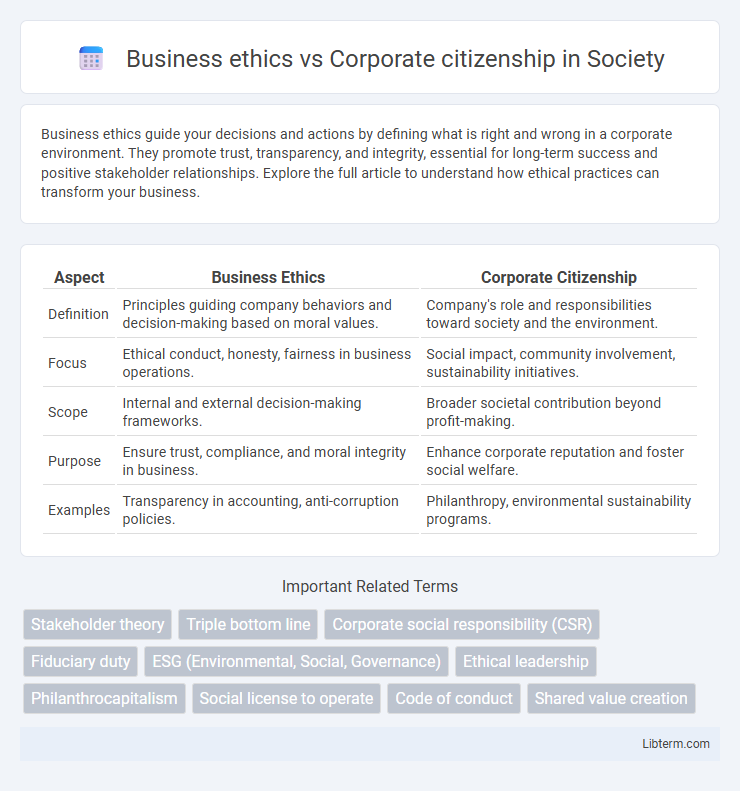Business ethics guide your decisions and actions by defining what is right and wrong in a corporate environment. They promote trust, transparency, and integrity, essential for long-term success and positive stakeholder relationships. Explore the full article to understand how ethical practices can transform your business.
Table of Comparison
| Aspect | Business Ethics | Corporate Citizenship |
|---|---|---|
| Definition | Principles guiding company behaviors and decision-making based on moral values. | Company's role and responsibilities toward society and the environment. |
| Focus | Ethical conduct, honesty, fairness in business operations. | Social impact, community involvement, sustainability initiatives. |
| Scope | Internal and external decision-making frameworks. | Broader societal contribution beyond profit-making. |
| Purpose | Ensure trust, compliance, and moral integrity in business. | Enhance corporate reputation and foster social welfare. |
| Examples | Transparency in accounting, anti-corruption policies. | Philanthropy, environmental sustainability programs. |
Understanding Business Ethics: Core Principles
Business ethics revolves around principles such as integrity, transparency, accountability, and fairness guiding decision-making and behavior within organizations. Corporate citizenship emphasizes a company's social responsibilities and its role in contributing positively to communities and the environment. Understanding business ethics involves recognizing moral duties that ensure trustworthiness and compliance beyond legal requirements.
Defining Corporate Citizenship: Key Concepts
Corporate citizenship refers to a company's responsibilities toward society, emphasizing ethical conduct, sustainable practices, and community engagement. It extends beyond compliance and profit, integrating social, environmental, and economic impacts into business strategies. Key concepts include corporate social responsibility (CSR), stakeholder engagement, and commitment to ethical governance.
Historical Evolution: From Ethics to Citizenship
Business ethics emerged in the mid-20th century, emphasizing moral principles guiding corporate behavior and decision-making to prevent misconduct and build trust. Corporate citizenship evolved later, expanding the focus to include a company's social and environmental responsibilities within the broader community, reflecting a shift towards sustainable and ethical business practices. This historical evolution marks the transition from merely adhering to ethical norms to actively contributing to societal well-being and stakeholder engagement.
Comparing Business Ethics and Corporate Citizenship
Business ethics involves the principles and moral values guiding individual and organizational behavior in business decisions, ensuring fairness, transparency, and accountability. Corporate citizenship refers to a company's broader responsibility to contribute positively to society and the environment, reflecting its commitment beyond profit-making. While business ethics focuses on internal conduct and decision-making standards, corporate citizenship emphasizes external social impact and community engagement.
Legal Compliance vs. Social Responsibility
Business ethics primarily centers on legal compliance, ensuring companies adhere to laws and regulations to avoid legal penalties and maintain trust with stakeholders. Corporate citizenship emphasizes social responsibility, encouraging organizations to contribute positively to society beyond legal obligations, including environmental sustainability and community engagement. Integrating both concepts fosters a balanced approach where businesses operate ethically within legal frameworks while actively supporting social and environmental causes.
Stakeholder Expectations in Modern Business
Stakeholder expectations in modern business emphasize ethical practices and corporate citizenship as interconnected yet distinct concepts, where business ethics involve adherence to moral principles guiding decision-making, while corporate citizenship reflects a company's commitment to social responsibility and community engagement. Companies must align operational strategies to meet diverse stakeholder demands, including transparency, environmental sustainability, and social impact, ensuring trust and long-term value creation. Meeting these expectations enhances reputation, supports regulatory compliance, and fosters stronger relationships with customers, employees, investors, and society at large.
Ethical Decision-Making in Corporate Settings
Ethical decision-making in corporate settings requires balancing business ethics, which emphasizes principles like honesty, fairness, and integrity, with corporate citizenship, which focuses on a company's social responsibilities and impact on stakeholders. Companies that integrate both frameworks promote transparent policies, responsible governance, and stakeholder engagement to ensure decisions align with moral obligations and societal expectations. This integration fosters trust, mitigates risks, and enhances long-term sustainability by embedding ethical considerations into corporate strategy and operations.
Impact of Corporate Citizenship on Brand Reputation
Corporate citizenship significantly enhances brand reputation by demonstrating a company's commitment to social responsibility and ethical practices, which fosters trust and loyalty among consumers and stakeholders. Active engagement in community development and environmental sustainability initiatives strengthens public perception and differentiates the brand in competitive markets. Positive corporate citizenship also mitigates risks by aligning business operations with societal values, resulting in sustained reputational capital.
Case Studies: Best Practices in Ethics and Citizenship
Case studies in business ethics and corporate citizenship reveal how companies integrate moral principles with social responsibility to enhance reputation and stakeholder trust. Organizations like Patagonia and Unilever exemplify best practices by implementing transparent supply chains and sustainable environmental initiatives aligned with ethical governance. These real-world examples highlight the critical role of aligning ethical frameworks with corporate citizenship to drive long-term business success and positive community impact.
Future Trends: Integrating Ethics and Corporate Citizenship
Future trends in business ethics and corporate citizenship emphasize a holistic integration of ethical principles with proactive social responsibility initiatives, driven by stakeholder demands for transparency and sustainable practices. Companies increasingly adopt advanced technologies like AI for ethical decision-making and deploy comprehensive ESG strategies to align business operations with broader societal goals. This convergence fosters resilient corporate cultures that prioritize long-term value creation, accountability, and community engagement in a rapidly evolving global marketplace.
Business ethics Infographic

 libterm.com
libterm.com